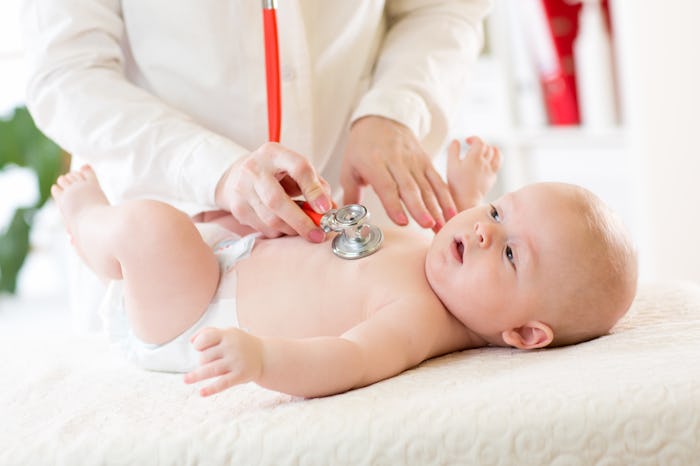Life
This Infection Kills More Than 100,000 Babies A Year, & There's Still No Vaccine For It
Doctors and scientists constantly work to make childbirth safer for both moms and babies, but there are still improvements to be made. Case in point: One vaccine could save more than 100,000 babies annually— if only it were available. In a series of 11 papers recently presented at the American Society of Tropical Medicine and Hygiene Annual Meeting in Baltimore, researchers found that the development of a vaccine for Group B Streptococcus (GBS), which is incredibly common among pregnant women, could prevent a staggering number of infant deaths and stillbirths across the globe.
About one-fifth of pregnant women have GBS, which can naturally occur in vaginal tracts, according to HuffPost UK. And while hosting the GBS bacteria is typically NBD for healthy adults, it can have devastating effects for their babies. In some (relatively rare) cases, babies can acquire the bacteria from their mothers during labor, and their underdeveloped immune systems make it possible for the bacteria to spread throughout their bodies and cause infections like meningitis. It also poses the very real threat of stillbirths.
In fact, researchers from the London School of Hygiene and Tropical Medicine (LSHTM) estimated that 90,000 infants die and 157,000 pregnancies result in stillbirths worldwide each year because of GBS, The Guardian reported. And they said that estimate is probably pretty conservative.
But much of that loss of life could be avoided, the researchers wrote as part of the data collected in their study, if a vaccine that was 80 percent effective could reach 90 percent of women. They believe that a vaccine would prevent up to 231,000 infant and maternal cases of the disease. Unfortunately, such potentially life-saving vaccines are only now in development, as Joy Lawn, co-lead author of the papers and professor of maternal, reproductive, and child health at the LSHTM, told The Guardian:
Vaccines are the way to go. They are on the way but it is going to be probably a five-year time horizon. The vaccine process needs to be accelerated. The World Health Organisation is already moving to make sure that when we get a vaccine it will be available for countries where the need is highest.
Women giving birth in rich nations often have the option to take antibiotics during labor to prevent passing GBS to their baby, The Guardian reported. That doesn't inoculate them against stillbirths, though, and it's an option often not available to those in developing nations. There's little doubt that the development of a safe and effective vaccine presents the best hope of saving as many babies as possible.
The Mayo Clinic recommends that all women get screened for GBS during their third trimester, and get antibiotic treatment if necessary. That will help to protect babies from both the early- and late-onset versions of GBS. Those who have the early-onset iteration will display symptoms such as fever, difficulty feeding, and lethargy within the first week after birth. Late-onset symptoms include difficulty breathing, fever, difficulty feeding, lethargy, and irritability and will emerge between a week and a few months post-birth. Adults with the bacteria usually go symptom-free.
As HuffPost pointed out, GBS is responsible for more neonatal deaths than tetanus, pertussis, and respiratory syncytial virus combined. For each of those, though, there is either a vaccine already available or one farther along in production than a vaccine for GBS. That statistic alone shows just how urgent it is that researchers do what they can to get the vaccine on the market as soon as possible. For some families, it will make all the difference in the world.
Watch Romper's new video series, Romper's Doula Diaries:
Check out the entire Romper's Doula Diaries series and other videos on Facebook and the Bustle app across Apple TV, Roku, and Amazon Fire TV.
